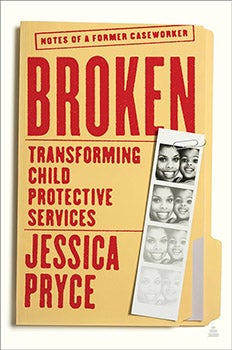Faculty Member’s New Book Shares Insights and Ideas for Reimagining Child Welfare

Dr. Jessica Pryce, a research faculty member at the Florida State University College of Social Work, launched her new book, BROKEN: Transforming Child Protective Services…Notes of a Former Caseworker this March. Dr. Pryce uses her expertise as a social worker and former caseworker in the book to explore the issues found within the United States child welfare system.
Published by Harper Collins, Broken highlights the disadvantages faced by economically disadvantaged and vulnerable families, along with the need for intentional training and development of the workforce relating to power dynamics and partnership with families. "The longer I worked in the system, the more I noticed the negative impacts of the work and how many families already had the odds stacked against them," she explained. "And then, the more I experienced moral distress and conflict while working my cases."
The book charts Dr. Pryce's professional journey, personal development, and cases and circumstances, providing insight along the way, starting with her graduate school internship with CPS while a student at the Florida State University College of Social Work and throughout her career in child welfare.
"As Jessica walks alongside these mothers as they try to navigate the CPS system, she begins to re-direct her career, which moved her towards a new way of working, and away from perpetuating the harm," wrote the book's promoter in a media release. "Through the lens of the author's transformative journey, readers are compelled to confront their own preconceptions and envision a more compassionate and effective approach to promoting safety and helping families in need."
In the book, Dr. Pryce calls for a reimaging of how families can be genuinely supported and how our mindset as professionals impacts our decisions. She is stressing the need for a family-centered approach with the goal of protecting children while also strengthening and preserving families.
 Broken also highlights the struggles of child welfare professionals, emphasizing the burnout and moral distress of child welfare professionals, recognizing the internal struggles and moral dilemmas they encounter in their roles. Readers will likely feel conflict as they read the complexities of the cases, which is a testament to what child welfare professionals face daily. In a recent interview with NPR, Pryce discusses how these conditions often lead to turnover and how workforce instability negatively impacts case progress and outcomes.
Broken also highlights the struggles of child welfare professionals, emphasizing the burnout and moral distress of child welfare professionals, recognizing the internal struggles and moral dilemmas they encounter in their roles. Readers will likely feel conflict as they read the complexities of the cases, which is a testament to what child welfare professionals face daily. In a recent interview with NPR, Pryce discusses how these conditions often lead to turnover and how workforce instability negatively impacts case progress and outcomes.
Uniquely, Dr. Pryce notes the importance of the child welfare workforce in driving true change in the system. Often, the workforce feels like change is happening to them and that they are part of it, but this book places them at the center of the change. This book encourages child welfare professionals to see themselves as catalysts for a new system, urging them to engage in introspection and embrace radical growth. In doing so, they can contribute to shifting towards more compassion, equity, and effectiveness. A system that they would take pride in and find professional fulfillment in.
The book discusses ways to build capacity within the child welfare workforce to ensure that they have the necessary tools, support, and training to implement positive changes within themselves and, ultimately, the system. The book also stresses how other community partners, mental health professionals, and mandated reporters can participate in the change. As an example, Pryce hopes that mandated reporters can reconsider their role as mandated "supporters" who are able to pause and think critically before reporting. In the book, she offers a resource titled, "Considerations before reporting to CPS". "Sometimes after that pause, they still need to report their concerns," explained Dr. Pryce, "But sometimes, they have been able to explore other supportive options for the family." This is crucial so that the child welfare workforce only receives cases which need their dire attention.
Dr. Pryce is currently a faculty member at the FSU College of Social Work and is the project director for the Florida Institute for Child Welfare's Alliance for Workforce Enhancement. She has spent more than 15 years working in the field of child welfare in a diverse number of roles, starting as a frontline worker and including positions in research, teaching, training, and policy development.
During her career, she has trained more than 200 child welfare organizations across the country to empower child welfare professionals to reimagine their role and their work.
The book's ultimate call to action encourages child welfare professionals and any readers of the publication to engage in honest introspection and to be active participants in a revolutionary shift towards a system focused on child and family wellbeing.
"In this groundbreaking work, through powerful everyday stories, Dr. Pryce shows the fault lines within child protective services and grounds us in new ways to think about and fix this beleaguered system," said Michael Eric Dyson, New York Times bestselling author of Tears We Cannot Stop.
